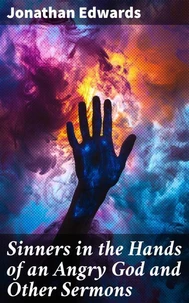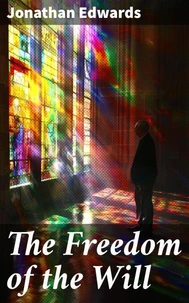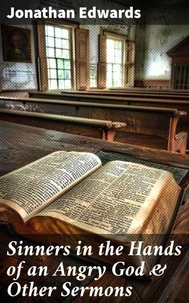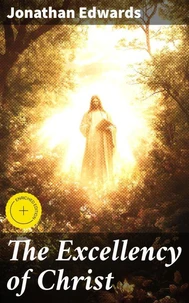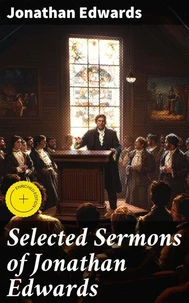The Religious Affections
Par :Formats :
Disponible dans votre compte client Decitre ou Furet du Nord dès validation de votre commande. Le format ePub est :
- Compatible avec une lecture sur My Vivlio (smartphone, tablette, ordinateur)
- Compatible avec une lecture sur liseuses Vivlio
- Pour les liseuses autres que Vivlio, vous devez utiliser le logiciel Adobe Digital Edition. Non compatible avec la lecture sur les liseuses Kindle, Remarkable et Sony
 , qui est-ce ?
, qui est-ce ?Notre partenaire de plateforme de lecture numérique où vous retrouverez l'ensemble de vos ebooks gratuitement
Pour en savoir plus sur nos ebooks, consultez notre aide en ligne ici
- Nombre de pages343
- FormatePub
- ISBN859-65--4700302-1
- EAN8596547003021
- Date de parution17/05/2022
- Protection num.Digital Watermarking
- Taille605 Ko
- Infos supplémentairesepub
- ÉditeurDIGICAT
Résumé
In "The Religious Affections, " Jonathan Edwards explores the complex interplay between emotion and spirituality, crafting a profound analysis of genuine religious experience versus mere enthusiasm. Written in the 18th century, this influential treatise utilizes a combination of philosophical discourse and theological reflection, drawing upon Edwards' profound understanding of Puritanism and the First Great Awakening.
Through meticulous reasoning, he delineates the characteristics of true godly affections, distinguishing them from deceptive sentiments, thereby providing a vital theological framework that resonates within the broader context of American religious thought. Jonathan Edwards, widely regarded as one of America's foremost theologians, was deeply influenced by his Puritan heritage and the tumultuous religious landscape of his time.
Born in 1703, Edwards became a leading figure in the First Great Awakening, experiencing firsthand the fervor and challenges of revivalism. His intellectual rigor and pastoral sensitivity compelled him to address the emotional landscape of faith, prompting him to write this critical work that seeks to authenticate the spiritual experiences of individuals. "The Religious Affections" is essential for anyone seeking a deeper understanding of the nature of true spirituality.
Edwards' incisive insights into the human heart and the role of emotion in faith make this book not only a theological classic but also a timeless guide for contemporary seekers, urging readers to reflect on the authenticity of their religious experiences.
Through meticulous reasoning, he delineates the characteristics of true godly affections, distinguishing them from deceptive sentiments, thereby providing a vital theological framework that resonates within the broader context of American religious thought. Jonathan Edwards, widely regarded as one of America's foremost theologians, was deeply influenced by his Puritan heritage and the tumultuous religious landscape of his time.
Born in 1703, Edwards became a leading figure in the First Great Awakening, experiencing firsthand the fervor and challenges of revivalism. His intellectual rigor and pastoral sensitivity compelled him to address the emotional landscape of faith, prompting him to write this critical work that seeks to authenticate the spiritual experiences of individuals. "The Religious Affections" is essential for anyone seeking a deeper understanding of the nature of true spirituality.
Edwards' incisive insights into the human heart and the role of emotion in faith make this book not only a theological classic but also a timeless guide for contemporary seekers, urging readers to reflect on the authenticity of their religious experiences.
In "The Religious Affections, " Jonathan Edwards explores the complex interplay between emotion and spirituality, crafting a profound analysis of genuine religious experience versus mere enthusiasm. Written in the 18th century, this influential treatise utilizes a combination of philosophical discourse and theological reflection, drawing upon Edwards' profound understanding of Puritanism and the First Great Awakening.
Through meticulous reasoning, he delineates the characteristics of true godly affections, distinguishing them from deceptive sentiments, thereby providing a vital theological framework that resonates within the broader context of American religious thought. Jonathan Edwards, widely regarded as one of America's foremost theologians, was deeply influenced by his Puritan heritage and the tumultuous religious landscape of his time.
Born in 1703, Edwards became a leading figure in the First Great Awakening, experiencing firsthand the fervor and challenges of revivalism. His intellectual rigor and pastoral sensitivity compelled him to address the emotional landscape of faith, prompting him to write this critical work that seeks to authenticate the spiritual experiences of individuals. "The Religious Affections" is essential for anyone seeking a deeper understanding of the nature of true spirituality.
Edwards' incisive insights into the human heart and the role of emotion in faith make this book not only a theological classic but also a timeless guide for contemporary seekers, urging readers to reflect on the authenticity of their religious experiences.
Through meticulous reasoning, he delineates the characteristics of true godly affections, distinguishing them from deceptive sentiments, thereby providing a vital theological framework that resonates within the broader context of American religious thought. Jonathan Edwards, widely regarded as one of America's foremost theologians, was deeply influenced by his Puritan heritage and the tumultuous religious landscape of his time.
Born in 1703, Edwards became a leading figure in the First Great Awakening, experiencing firsthand the fervor and challenges of revivalism. His intellectual rigor and pastoral sensitivity compelled him to address the emotional landscape of faith, prompting him to write this critical work that seeks to authenticate the spiritual experiences of individuals. "The Religious Affections" is essential for anyone seeking a deeper understanding of the nature of true spirituality.
Edwards' incisive insights into the human heart and the role of emotion in faith make this book not only a theological classic but also a timeless guide for contemporary seekers, urging readers to reflect on the authenticity of their religious experiences.




